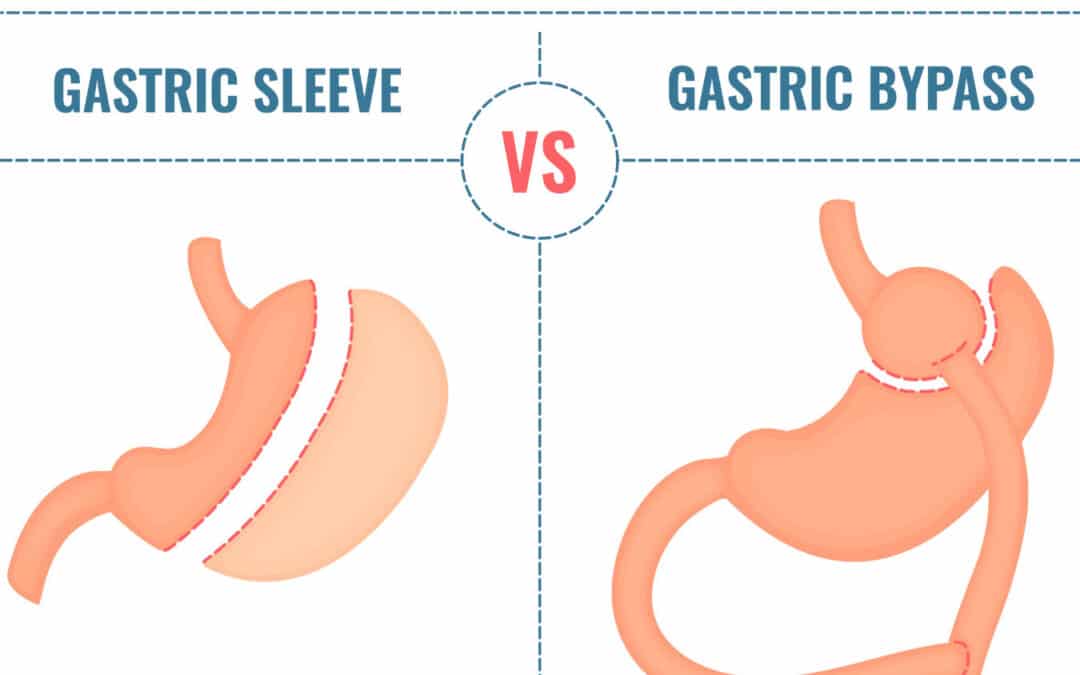If you’re considering weight loss surgery, whether you only have twenty pounds to lose or are looking for a more significant change, it is important to know what options are available to you. There are a few different types of weight loss surgery, but the two most common procedures are gastric bypass and a sleeve gastrectomy (otherwise known as gastric sleeve).
Both options pose their own benefits and drawbacks, so before you settle on your surgeon or surgery, use this article to learn more about each.
What is a Gastric Bypass?
Gastric bypass is a minimally invasive bariatric surgery. During a gastric bypass, your surgeon uses staples to reduce your upper stomach to a small pouch the size of an egg, reducing the amount of food you can consume in one sitting. The new, smaller stomach pouch is then connected to the small intestine.
During post-op digestion, the food you consume is then routed through the pouch directly into the small intestine, reducing the amount of fat and calories that your body absorbs. It is important to note that this procedure also reduces the amount of vitamins and minerals you can get from your food as well. As such, gastric bypass patients require yearly check-ups for monitoring and daily supplemental vitamins to remain healthy.
Gastric bypass surgery takes several hours and is performed under general anesthesia.
What is Sleeve Gastrectomy?
Sleeve gastrectomy, or gastric sleeve surgery is a type of laparoscopic bariatric surgery aimed at reducing your food intake. Using small incisions, your doctor removes most of the left part of your stomach, leaving a smaller, narrow “sleeve” stomach behind.
Following surgery, food moves from the stomach directly into the small intestine, just like before the procedure. The small intestine isn’t modified; rather, the new shape of your stomach simply allows you to feel more full with less food.
Like gastric bypass, a sleeve gastrectomy surgery takes several hours and is performed under general anesthesia.
Pros and Cons of Each
Both bariatric procedures address the root of the problem by helping patients feel fuller for longer and require less calories. Both procedures have the same qualification requirements of health problems, BMI measurements, etc. If you are covered by health insurance, both procedures are covered at the same level. Keep in mind, though, that weight loss surgery insurance approval can take anywhere from thirty days to several months, and each insurance policy has their own requirements for surgery.
While each procedure produces similar results two years post-op, bypass patients tend to successfully keep the weight off longer. However, gastric sleeve recovery is easier and takes less time than bypass, and bypass patients must more closely monitor their vitamin levels following surgery.
If you aren’t covered by insurance, gastric bypass and gastric sleeve surgeries can be paid in cash, often at a discounted, affordable rate. Total Medical cash prices are listed online and start at $5,999. Both procedures are considered safe and have a 99.8% survival rate, though bypass poses a higher risk of both complications and side effects.
Studies have shown that both gastric bypass and the gastric sleeve provide very similar health improvements for diabetes, hypertension, sleep apnea, and most other obesity-related cancers/health problems.
Bariatric Surgery in Houston – Total Medical Weight Loss
At Total Medical, safe, effective, and affordable care is our top priority. Therefore, we strive to provide the best patient experience across all Total Medical affiliated sites. The high-quality care starts at our Weight Loss Programs and carries on through our Clinics and Total Medical Solutions.
Whether you’re looking for a solution for obesity-related health issues, or are seeking help to lose those last stubborn 20-40 pounds, our surgical team is highly skilled and are ready to help. To learn more, or to schedule a consultation for bariatric surgery, visit us at https://totalmedicalweightloss.com.
Follow Total Medical on social media!

